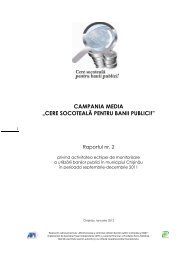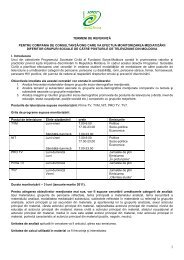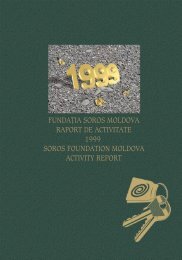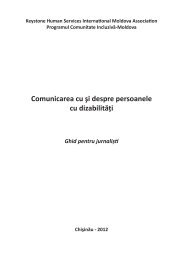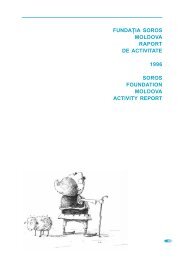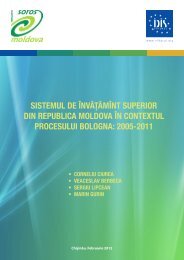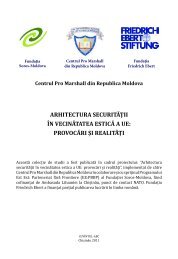Perceptions of the Population of the Republic of Moldova - Soros ...
Perceptions of the Population of the Republic of Moldova - Soros ...
Perceptions of the Population of the Republic of Moldova - Soros ...
- No tags were found...
You also want an ePaper? Increase the reach of your titles
YUMPU automatically turns print PDFs into web optimized ePapers that Google loves.
<strong>Perceptions</strong> <strong>of</strong> <strong>the</strong> <strong>Population</strong> <strong>of</strong> <strong>the</strong> <strong>Republic</strong> <strong>of</strong> <strong>Moldova</strong> on Discrimination: Sociological Study 535. Personal experiences <strong>of</strong> respondents in <strong>the</strong> field <strong>of</strong>discriminationViolation <strong>of</strong> rights and discrimination <strong>of</strong> respondents.According to <strong>the</strong> results <strong>of</strong> <strong>the</strong> Study, 37% <strong>of</strong> <strong>the</strong> respondents said <strong>the</strong>y felt that <strong>the</strong>ir rights wereviolated at least once during <strong>the</strong> past three years. 61% mentioned that <strong>the</strong>ir rights were never violatedduring <strong>the</strong> past 3 years, while 2% gave no answer (Chart 37).Chart 37. Distribution <strong>of</strong> respondents based on whe<strong>the</strong>r or not <strong>the</strong>ir rights were violated during <strong>the</strong> past threeyears, %237yesno61I don’tknowThe share <strong>of</strong> respondents who said <strong>the</strong>ir rights were violated during <strong>the</strong> past 3 years is higher in <strong>the</strong>urban area (39%), in <strong>the</strong> group <strong>of</strong> people with graduate studies (43%), and among those <strong>of</strong><strong>Moldova</strong>n/Romanian ethnicity (44%).36% <strong>of</strong> those who consider <strong>the</strong>ir rights were violated said <strong>the</strong>ir employment rights were not observed,31% – <strong>the</strong> right to be remunerated according to <strong>the</strong> work done, 31% – <strong>the</strong> right to healthcare, 23% – <strong>the</strong>right to social protection, 18% – <strong>the</strong> right to justice, 75% – <strong>the</strong> right to goods and services, and 6% – <strong>the</strong>right to education (see Chart 38).The share <strong>of</strong> people who were subject to violation <strong>of</strong> <strong>the</strong>ir right to employment during <strong>the</strong> past 3 yearsis higher in <strong>the</strong> urban area (41%), among men (42%), and among people aged 49 or less (39%), amongBulgarians (72%), Russians (47%), and Gagauz people (43%).The share <strong>of</strong> people who were subject to violation <strong>of</strong> <strong>the</strong>ir right to be remunerated according to <strong>the</strong>work done, during <strong>the</strong> past 3 years, is higher in <strong>the</strong> urban area (36%), among men (38%), and people withgraduate and postgraduate studies (41%).The share <strong>of</strong> people whose rights to healthcare were not observed during <strong>the</strong> past 3 years is higheramong women (35%), people aged over 50 (40%), <strong>the</strong> retired persons and persons with disabilities (42%),and <strong>the</strong> persons with a low well-being (34%).




